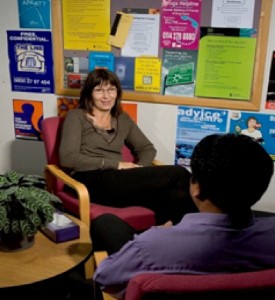January is a difficult time of year for many of us, with cold weather, long hours of darkness and the next holiday a long way off. In addition invariably there is a need to recover from the financial impact of Christmas, a period of overindulgence in rich unhealthy foods and New Year’s resolutions that we have perhaps not achieved. Student Wellbeing aims to offer advice on how to Beat the January Blues and to raise awareness of organisations that can help. Please share this information with other staff members and with students. There will be a display of useful materials in the Student Wellbeing area on Level 1 of the Surrey Building from Wednesday 14th January.
Eat Well
Omega 3 fatty acids found in oily fish, flaxseed oil, nuts and seeds can help combat low mood as can folate found in cabbage broccoli and sprouts. Low blood sugar can affect energy and mood so don’t skip breakfast! Healthy recipes can be found at http://www.bbcgoodfood.com/howto/guide/keep-momentum-how-beat-january-blues-0
Exercise and sleep
Regular moderate physical activity is effective in managing mild to moderate anxiety and depression. This does not have to be formal exercise and can include going for a 30 minute brisk walk several times per week. Student Wellbeing runs an Exercise Prescription Scheme in conjunction with SHU Active to help students manage low mood and other psychological difficulties (contact Student Wellbeing for more information). It is also important to establish a regular pattern of sleep – maintaining a consistent getting up time will help with this.
Connect
Avoiding contact with others has an adverse effect on mood. Countless studies have found that face to face contact is essential for our wellbeing. Arrange to see family and friends regularly.
Set realistic goals
Setting New Year’s resolutions that we are unable to stick to can leave us feeling negative. Set goals that you know you can achieve.
Get professional help
If you are worried about persistent low mood, speak to your GP or contact the Student Wellbeing Service at student.wellbeing@shu.ac.uk
Acts of kindness
Giving to others, for example through volunteering is a great way of connecting, as well as having a positive input on our wellbeing and helping to structure our time. There are small things that we can do on a daily or weekly basis that will help other people feel good too.
Organisations that can help
The following organisations can help you to achieve some of the above as well as offering advice and support in relation to mental health and wellbeing:
http://www.mentalhealth.org.uk/
http://www.samaritans.org/ or email jo@samaritans.org
http://www.prevent-suicide.org.uk/stay_alive_suicide_prevention_mobile_phone_application.html
https://bigwhitewall.com/university
http://hallamunion.org/volunteering



